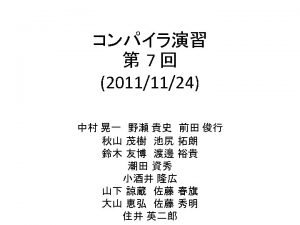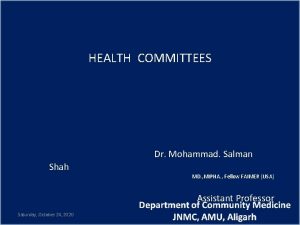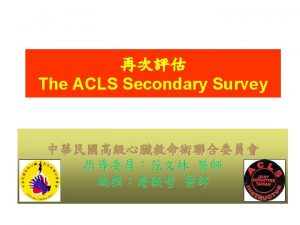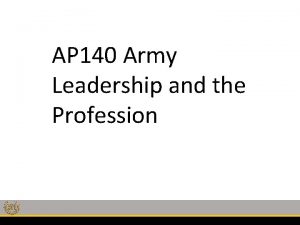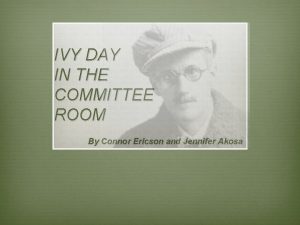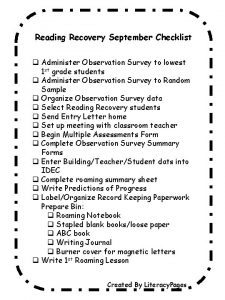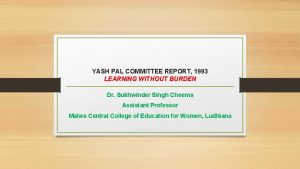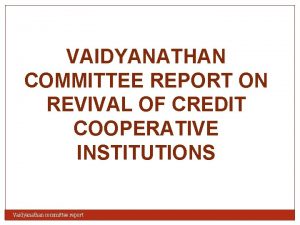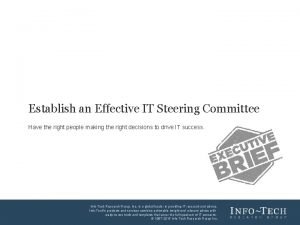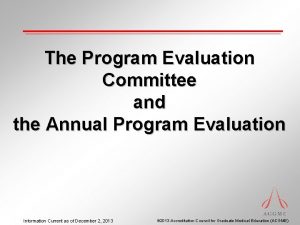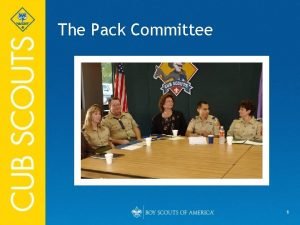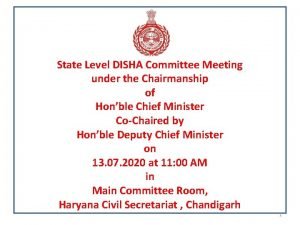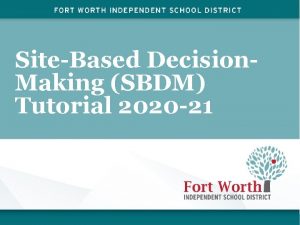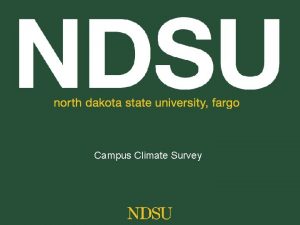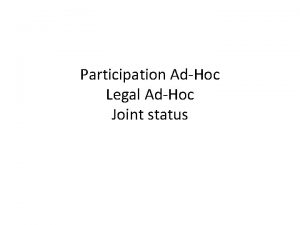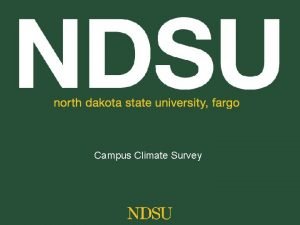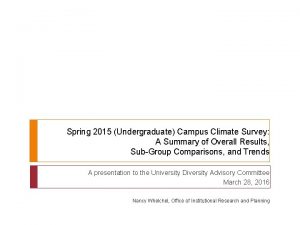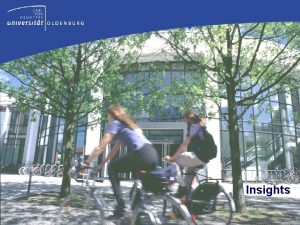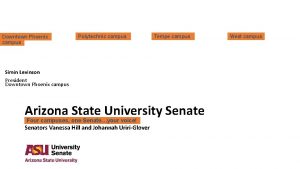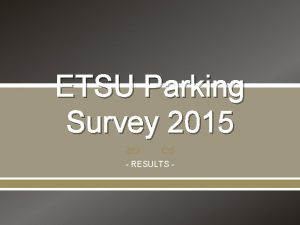Campus Climate Survey Summary Campus Climate AdHoc Committee



















- Slides: 19

Campus Climate Survey Summary Campus Climate Ad-Hoc Committee Bernadette Buchanan Ph. D, Jean Constable MEd, MBA Corinne Castro Ph. D, Daniel Braaten Ph. D

Campus Culture “God calls us to love our neighbors through an open and welcome heart. May he grant us the grace to walk through this journey in justice and peace as we advocate for the values that bind us all” -Kristi Quiros, TLU Vice President and Dean of Students, 2018

Why do a Campus Climate Survey?

Why is a strong campus climate important?

How was it done?

Campus Climate Survey Ad-Hoc Committee • 2 year empirical study using qualitative and quantitative survey methods • Examined student and employee experiences of interpersonal violence & racial/ethnic bias at TLU • Funded by TLU Title IX Office • Dr. Dan Braaten, Dr. Corinne Castro, Dr. Bernadette Buchanan, Jean Constable with assistance from J. R. Gibson & Cori Cunningham • Amie Bedgood and Danna Salinas, focus group champions of the world!

Collaboration & Institutional Stakeholders Title IX coordinators & investigators Institutional research representative Communications representatives Faculty & staff with content expertise Stakeholder Working Group Student leaders Student Interns in Institutional Research and Title IX Student affairs professionals Office of Dean of Students representatives

Pre-Survey Process Choose Survey Marketing plan Administration Edit for TLU needs Spanish translation Strategies & tactics Timeline Launch Survey E-mail reminders

Overview of Survey Shallow Dive Collected data on student, faculty & staff perceptions and experiences of gender based violence and racial/ethnic bias through a web-based survey. Medium Dive Used Qualitative student focus group data and faculty/staff survey comments to enrich survey results. Deep Dive Findings leading to recommendations Recommendations are primarily centered on clarifying complaint processes, addressing safety concerns, and improving intercultural communication Graphic credits: UT Austin Analyzed disaggregated frequency distributions of survey responses and focus group discussion data to formulate recommendations.

Survey Topical Modules 1. 2. 3. 4. 5. 6. 7. 8. 9. 10. 11. 12. Possible Outcomes Peer Norms (student version only) Perceptions of Campus Climate Racial and Ethnic Bias Sexual Harassment *By Students *By Faculty/staff Victimization *Stalking *Cyber *Psychological dating violence *Physical dating violence *Sexual violence Institutional Responses Peer Responses Consent Bystander Intervention Campus Safety Demographics

The impact of a great marketing plan! • Student response rate 43% • Faculty & staff response rate 61%

What did the survey tell us? Some strengths: • In general, students, faculty, & staff are happy with the TLU educational and work experience. • Most respondents agree in the need for more “diversity” on our campus. While the agreement of needing more diversity is a strength, a big challenge lies within. • Both employees and students feel a strong sense of belonging at TLU

What did the survey tell us? Some challenges: • African American students and Latino/a faculty/staff experience more incidents of racial microaggressions. • Faculty & staff have low rates of satisfaction regarding diversity of the TLU population. This is the top challenge for faculty & staff. • Most concerning to the committee is that 18 individual students described incidents of sexual misconduct by a faculty or staff member. None reported it to a TLU employee.

Qualitative Data Collection • We have conducted 7 student focus groups with over 40 total students, male only and female only groups for White, Latino/a, Black/African American students, and one for LGBTQIA students

Some Student Focus Group Remarks • Students note that TLU was “reactive” versus “proactive” and that there was a systemic failure regarding the need to discuss race. • Black/African American and Hispanic students want to be recognized and accepted for who they are and not as a “sub-population. ”

Sample of recommendations • Host face-to-face discussions to complement existing sexual misconduct and harassment programming • Develop a 5 -year action plan to increase diversity in the faculty, diversity in the student body, and to increase and improve interactions among diverse populations • Develop an initiative funded by the TLU President’s office to send 2 employees per year to the National Conference on Race and Ethnicity (NCORE) in Higher Education or Social Justice Training Institute (SJTI)

Limitations of Findings • Survey was very long • Survey response scales were inconsistent • Some survey items were confusing or not appropriate for all respondents • There is not comparison group data to benchmark against • Personal nature of survey may have inhibited some respondents

Next Steps • Survey instrument revision • Plan for next administration in fall 2019 • Formulate an assessment plan of the strategies and recommendations implemented

Questions?
 Ad-hoc polymorphism
Ad-hoc polymorphism Adhoc.com
Adhoc.com Mipha in medical
Mipha in medical Abcde acls
Abcde acls Army ethical lenses
Army ethical lenses Erscs
Erscs Climate change 2014 mitigation of climate change
Climate change 2014 mitigation of climate change Ivy day in the committee room analysis
Ivy day in the committee room analysis Predictions of progress reading recovery examples
Predictions of progress reading recovery examples Recommendations of yashpal committee report 1993
Recommendations of yashpal committee report 1993 Trade promotion coordinating committee
Trade promotion coordinating committee Vaidyanathan committee report related to revival of
Vaidyanathan committee report related to revival of It steering
It steering Program evaluation committee checklist
Program evaluation committee checklist Pack committee
Pack committee Organizing committee structure for an event
Organizing committee structure for an event Subject verb agreement purdue owl
Subject verb agreement purdue owl Disha committee members salary
Disha committee members salary Sbdm committee
Sbdm committee Qatar 2022 background
Qatar 2022 background
